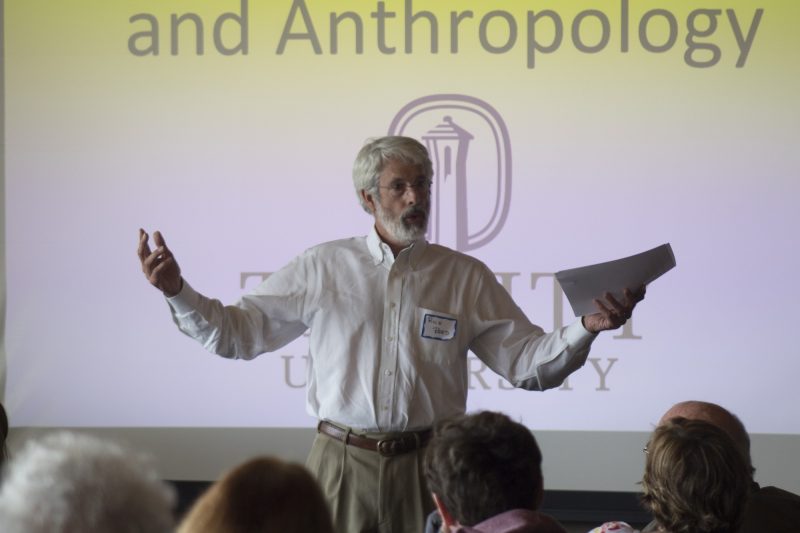The department of Sociology and Anthropology celebrated its 75th anniversary this year with a weekend full of presentations, speakers and receptions aimed at current students.
On Friday, Sept. 21, the department hosted a crash course on professional networking, student poster presentations and a reception in the George Storch Memorial Building. The next day, the department held a keynote lecture with Pableaux Johnson followed by a lecture on the history of the department given by Richard Reed, professor of anthropology, alumni talks celebrating the lives of deceased department professors, student discussions on department scholarships and two sessions of roundtable discussions with alumni. Afterwards, professors, students and alumni met at Bombay’s Bicycle Club.
Jennifer Mathews, professor of anthropology and department chair of Sociology and Anthropology, organized the event after learning of the anniversary from alumni affairs, informed by Douglas Brackenridge, Trinity historian.
“As Doug Brackenridge’s history tells us, departments didn’t really come into existence in the university until quite a bit after the formation. He mentioned the early use of the term department originally referred to short-term programs that were professionally oriented and did not merit academic credit,” Mathews said. “It’s not until the 20th century when we really see departments proliferating on Trinity’s campus. Our department first shows up on the book on 1943 as the department of sociology and then in 1971 we became the department of Sociology and Anthropology.”
After Mathews joined the department in 1999, the biggest change that had occurred was newfound emphasis placed on interdisciplinary programs.
“We added quite a few interdisciplinary programs, so we added environmental studies, we added urban studies, we’ve been a part of women and gender studies. We also contribute significantly to the MAS program and the EAST program. So I would say the biggest change I see is really in our contribution to multidisciplinary and interdisciplinary programs,” Mathews said.
Katherine Sibley, senior anthropology major, presented research she did last year on Friday at the poster presentations. Her research studied the links between abstinence, Christianity and sexual desire.
“We looked at how high rates of religiosity and receiving abstinence education in childhood years ultimately influenced sexual attitudes and behaviors within marriage. Overall, we found that higher rates of religiosity and women receiving abstinence education as children did lead to women maintaining that abstinence and being virgins when they married,” Sibley said.
Sibley believes her presenting brought validation to her project and helped her improve on her presentation skills.
“I was asked to present today by a professor so that alone felt really good. We put a lot of work into this it was a really stressful project so it was worth it in the end and to be recognized for that felt pretty nice. And it helps build skills and being able to talk to people on a one on one level but also in larger groups,” Sibley said.
Pableaux Johnson, the keynote luncheon speaker, graduated from Trinity in 1988 with a history major and a double minor in sociology and religion. Johnson referred to the strengths a student gains from Trinity’s education before his speech.
“Turning points in one’s career are completely coincidental and it’s how you react to them that gives you a bunch of different possibilities. That’s something you absolutely cannot see on the front end of this; it’s only something you can see looking back. You’ve got a lot more muscle and a lot more good tools and raw materials here with this education than you think you do,” Johnson said.
Mathews spoke about the importance of the student-focused aspect of the weekend.
“One of our jobs as a field — when some people say that’s a useless field, you’re going to go work fast food — we want to make it really clear that we’re going to train our students with skills that are going to allow them to pursue careers in anything,” Mathews said.
The cost of the free events was covered by donations and matched by Alumni Relations and Development. The leftover funds will be divided into the John Donahue Social Justice award and the Mike Kearl Sociology Scholarship.







